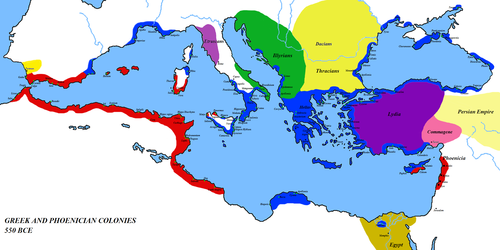
Back المستعمرات في العصور القديمة Arabic Антична колонизация Bulgarian Colònies al món antic Catalan Colonias en la antigüedad Spanish Koloni pada zaman kuno ID Colonie nell'antichità Italian 古代の植民都市 Japanese Colonias en Anticia LFN Kolonisering i antikken NB Colónias (Antiguidade) Portuguese

Colonies in antiquity were post-Iron Age city-states founded from a mother-city or metropolis rather than a territory-at-large. Bonds between a colony and its metropolis often remained close, and took specific forms during the period of classical antiquity.[1] Generally, colonies founded by the ancient Phoenicians, Carthage, Rome, Alexander the Great and his successors remained tied to their metropolis, though Greek colonies of the Archaic and Classical eras were sovereign and self-governing from their inception. While Greek colonies were often founded to solve social unrest in the mother-city by expelling a part of the population, Hellenistic, Roman, Carthaginian, and Han Chinese colonies were used for trade, expansion and empire-building.
- ^ Thomas R. Martin (1 August 2000). Ancient Greece: From Prehistoric to Hellenistic Times. Yale University Press. p. 56. ISBN 978-0-300-08493-1. Retrieved 24 February 2013.
...at their new location, colonists were expected to retain ties with their metropolis. A colony that sided with its metropolis's enemy in a war, for example was regarded as disloyal...